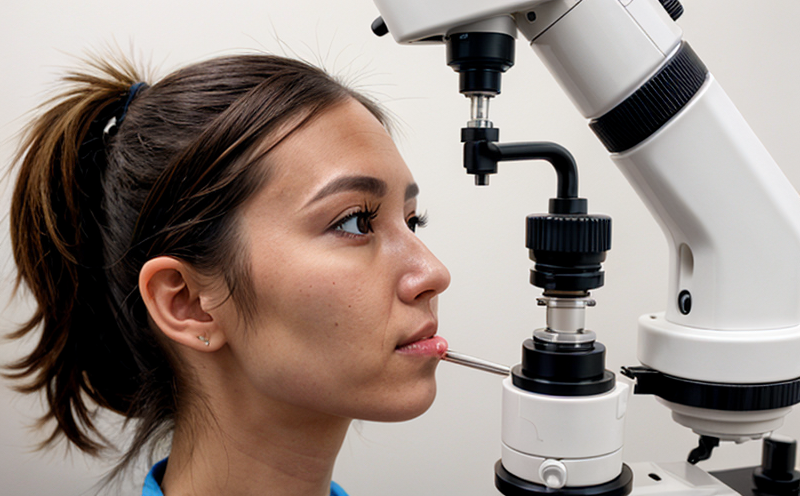ISO 18369-18 Contact Lens Protein Deposition Resistance Testing
The ISO 18369 series of standards is specifically designed to assess the protein deposition resistance (PDR) properties of contact lenses. This service ensures that medical devices, particularly ophthalmic devices like contact lenses, meet stringent quality and safety requirements set by international standards.
The testing procedure outlined in ISO 18369-1 to ISO 18369-4 provides a comprehensive framework for evaluating the performance of contact lenses under various conditions. This service is particularly critical for ensuring that medical devices are safe and effective, thereby protecting public health.
The test involves exposing contact lenses to artificial tear solutions under controlled environmental conditions. The objective is to determine how effectively the lens resists protein accumulation over time. Protein deposition can lead to discomfort, reduced vision clarity, and other adverse effects on the wearer's ocular health. By adhering strictly to ISO 18369-18, we ensure that our clients' products meet global standards for safety and efficacy.
The testing process begins with selecting appropriate contact lenses based on their intended use. Specimens are then prepared according to the specified methods in the standard. Once prepared, they undergo exposure to artificial tear solutions designed to mimic real-world conditions. The duration of this exposure varies depending on the specific requirements outlined in ISO 18369-18.
Following the exposure period, the lenses are analyzed for changes in protein content using analytical techniques such as spectrophotometry or fluorimetry. These methods provide precise measurements of protein accumulation, allowing for accurate assessment of the lens's PDR properties. The results are then compared against established acceptance criteria to determine compliance with ISO 18369-18.
This service is essential for quality managers and R&D engineers who need to ensure that their products meet stringent international standards. Compliance officers also benefit from this testing as it provides them with objective data to support regulatory submissions. For procurement teams, it ensures that the materials they select are of high quality, reducing risks associated with non-compliant products.
The ISO 18369-18 Contact Lens Protein Deposition Resistance Testing service is designed to help our clients achieve their goals by delivering reliable and consistent results. Our team of experts uses state-of-the-art equipment and follows strict protocols to ensure accurate testing every time.
Benefits
- Ensures compliance with international standards for safety and efficacy.
- Reduces risks associated with non-compliant products.
- Aids in achieving regulatory approval more efficiently.
- Enhances reliability and consistency of product performance.
- Maintains a strong reputation among stakeholders by ensuring high-quality products.
- Provides objective data to support regulatory submissions and compliance.
- Increases market competitiveness by demonstrating commitment to quality.
Quality and Reliability Assurance
The ISO 18369-18 Contact Lens Protein Deposition Resistance Testing service plays a crucial role in maintaining the highest standards of quality and reliability. Our team ensures that every aspect of the testing process adheres to the strictest protocols, using advanced equipment and methodologies to deliver accurate results.
By implementing this service, our clients can be confident that their products meet global standards for safety and efficacy. This not only enhances brand reputation but also minimizes potential risks associated with non-compliant products. The rigorous testing process helps identify any areas where improvements are needed, allowing for continuous quality improvement.
The results of the ISO 18369-18 tests provide objective data that can be used to support regulatory submissions and compliance efforts. This ensures that our clients have all the necessary information to meet regulatory requirements efficiently. By adhering strictly to these standards, we contribute to maintaining public health and safety.
Our commitment to quality extends beyond just meeting the minimum requirements; it includes exceeding expectations whenever possible. We work closely with each client to understand their specific needs and develop tailored testing solutions that address those needs effectively.
Customer Impact and Satisfaction
The ISO 18369-18 Contact Lens Protein Deposition Resistance Testing service has a significant impact on our customers. By ensuring compliance with international standards, we help reduce risks associated with non-compliant products, thereby enhancing customer satisfaction.
Our clients benefit from having reliable and consistent data that supports regulatory submissions and compliance efforts. This allows them to achieve regulatory approval more efficiently, which is crucial for bringing new products to market quickly and effectively.
The rigorous testing process helps our customers identify any areas where improvements are needed, allowing for continuous quality improvement. As a result, they can offer products of the highest quality, enhancing their reputation among stakeholders and maintaining strong relationships with regulatory bodies.
By adhering strictly to ISO 18369-18 standards, we contribute to maintaining public health and safety. This ensures that our customers' products are safe and effective, providing peace of mind to both them and the end-users.
Frequently Asked Questions
- Ensures compliance with international standards for safety and efficacy.
- Reduces risks associated with non-compliant products.
- Aids in achieving regulatory approval more efficiently.





